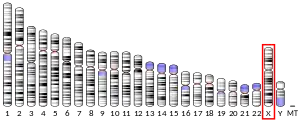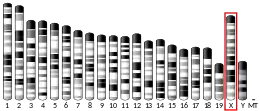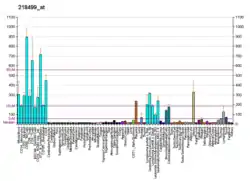Serine/threonine protein kinase MST4, also known as mammalian STE20-like protein kinase 4 (MST-4), is a protein that in humans is encoded by the MST4 gene.[5]
Function
The product of this gene is a member of the GCK group III family of kinases, which are a subset of the Ste20-like kinases. The encoded protein contains an amino-terminal kinase domain, and a carboxy-terminal regulatory domain that mediates homodimerization. The protein kinase localizes to the Golgi apparatus and is specifically activated by binding to the Golgi matrix protein GM130. It is also cleaved by caspase-3 in vitro, and may function in the apoptotic pathway. Several alternatively spliced transcript variants of this gene have been described, but the full-length nature of some of these variants has not been determined.[5]
Interactions
RP6-213H19.1 has been shown to interact with:
References
- 1 2 3 GRCh38: Ensembl release 89: ENSG00000134602 - Ensembl, May 2017
- 1 2 3 GRCm38: Ensembl release 89: ENSMUSG00000031112 - Ensembl, May 2017
- ↑ "Human PubMed Reference:". National Center for Biotechnology Information, U.S. National Library of Medicine.
- ↑ "Mouse PubMed Reference:". National Center for Biotechnology Information, U.S. National Library of Medicine.
- 1 2 "Entrez Gene: RP6-213H19.1 serine/threonine protein kinase MST4".
- 1 2 3 4 5 6 7 Goudreault M, D'Ambrosio LM, Kean MJ, Mullin MJ, Larsen BG, Sanchez A, Chaudhry S, Chen GI, Sicheri F, Nesvizhskii AI, Aebersold R, Raught B, Gingras AC (January 2009). "A PP2A phosphatase high density interaction network identifies a novel striatin-interacting phosphatase and kinase complex linked to the cerebral cavernous malformation 3 (CCM3) protein". Mol. Cell. Proteomics. 8 (1): 157–71. doi:10.1074/mcp.M800266-MCP200. PMC 2621004. PMID 18782753.
Further reading
- Liu KC, Wang D (1975). "[Synthesis of n-substituted beta-methyl DL-aspartates as potential hypocholesteremics (author's transl)]". Archiv der Pharmazie. 308 (7): 564–70. doi:10.1002/ardp.19753080712. PMID 1164178. S2CID 82913379.
- Qian Z, Lin C, Espinosa R, LeBeau M, Rosner MR (2001). "Cloning and characterization of MST4, a novel Ste20-like kinase". J. Biol. Chem. 276 (25): 22439–45. doi:10.1074/jbc.M009323200. PMID 11306563.
- Dan I, Watanabe NM, Kusumi A (2001). "The Ste20 group kinases as regulators of MAP kinase cascades". Trends Cell Biol. 11 (5): 220–30. doi:10.1016/S0962-8924(01)01980-8. PMID 11316611.
- Lin JL, Chen HC, Fang HI, Robinson D, Kung HJ, Shih HM (2001). "MST4, a new Ste20-related kinase that mediates cell growth and transformation via modulating ERK pathway". Oncogene. 20 (45): 6559–69. doi:10.1038/sj.onc.1204818. PMID 11641781. S2CID 27885152.
- Dan I, Ong SE, Watanabe NM, Blagoev B, Nielsen MM, Kajikawa E, Kristiansen TZ, Mann M, Pandey A (2002). "Cloning of MASK, a novel member of the mammalian germinal center kinase III subfamily, with apoptosis-inducing properties". J. Biol. Chem. 277 (8): 5929–39. doi:10.1074/jbc.M110882200. PMID 11741893.
- Sung V, Luo W, Qian D, Lee I, Jallal B, Gishizky M (2003). "The Ste20 kinase MST4 plays a role in prostate cancer progression". Cancer Res. 63 (12): 3356–63. PMID 12810671.
- Preisinger C, Short B, De Corte V, Bruyneel E, Haas A, Kopajtich R, Gettemans J, Barr FA (2004). "YSK1 is activated by the Golgi matrix protein GM130 and plays a role in cell migration through its substrate 14-3-3zeta". J. Cell Biol. 164 (7): 1009–20. doi:10.1083/jcb.200310061. PMC 2172068. PMID 15037601.
- Chan EH, Nousiainen M, Chalamalasetty RB, Schäfer A, Nigg EA, Silljé HH (2005). "The Ste20-like kinase Mst2 activates the human large tumor suppressor kinase Lats1". Oncogene. 24 (12): 2076–86. doi:10.1038/sj.onc.1208445. PMID 15688006. S2CID 27285160.
- Rual JF, Venkatesan K, Hao T, Hirozane-Kishikawa T, Dricot A, Li N, Berriz GF, Gibbons FD, Dreze M, Ayivi-Guedehoussou N, Klitgord N, Simon C, Boxem M, Milstein S, Rosenberg J, Goldberg DS, Zhang LV, Wong SL, Franklin G, Li S, Albala JS, Lim J, Fraughton C, Llamosas E, Cevik S, Bex C, Lamesch P, Sikorski RS, Vandenhaute J, Zoghbi HY, Smolyar A, Bosak S, Sequerra R, Doucette-Stamm L, Cusick ME, Hill DE, Roth FP, Vidal M (2005). "Towards a proteome-scale map of the human protein-protein interaction network". Nature. 437 (7062): 1173–8. Bibcode:2005Natur.437.1173R. doi:10.1038/nature04209. PMID 16189514. S2CID 4427026.
- Kimura K, Wakamatsu A, Suzuki Y, Ota T, Nishikawa T, Yamashita R, Yamamoto J, Sekine M, Tsuritani K, Wakaguri H, Ishii S, Sugiyama T, Saito K, Isono Y, Irie R, Kushida N, Yoneyama T, Otsuka R, Kanda K, Yokoi T, Kondo H, Wagatsuma M, Murakawa K, Ishida S, Ishibashi T, Takahashi-Fujii A, Tanase T, Nagai K, Kikuchi H, Nakai K, Isogai T, Sugano S (2006). "Diversification of transcriptional modulation: large-scale identification and characterization of putative alternative promoters of human genes". Genome Res. 16 (1): 55–65. doi:10.1101/gr.4039406. PMC 1356129. PMID 16344560.
- Ma X, Zhao H, Shan J, Long F, Chen Y, Chen Y, Zhang Y, Han X, Ma D (2007). "PDCD10 interacts with Ste20-related kinase MST4 to promote cell growth and transformation via modulation of the ERK pathway". Mol. Biol. Cell. 18 (6): 1965–78. doi:10.1091/mbc.E06-07-0608. PMC 1877091. PMID 17360971.




